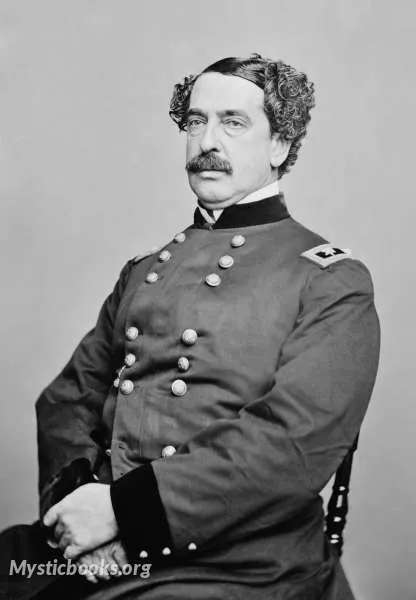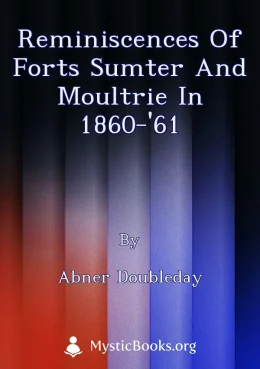
Timeline
Title
Country/Nationality
Abner Doubleday
Abner Doubleday was a career United States Army officer and Union major general in the American Civil War. He fired the first shot in defense of Fort Sumter, the opening battle of the war, and had a pivotal role in the early fighting at the Battle of Gettysburg. Gettysburg was his finest hour, but his relief by Maj. Gen. George G. Meade caused lasting enmity between the two men. In San Francisco, after the war, he obtained a patent on the cable car railway that still runs there. In his final years in New Jersey, he was a prominent member and later president of the Theosophical Society.
In 1908, 15 years after his death, Doubleday was declared by the Mills Commission to have invented the game of baseball (a claim never made by Doubleday during his lifetime). This claim has been thoroughly debunked by baseball historians.
Doubleday, the son of Ulysses F. Doubleday and Hester Donnelly, was born in Ballston Spa, New York, in a small house on the corner of Washington and Fenwick streets.
Abner spent his childhood in Auburn and later was sent to Cooperstown to live with his uncle and attend a private preparatory high school. He practiced as a surveyor and civil engineer for two years before entering the United States Military Academy in 1838. He graduated in 1842, 24th in a class of 56 cadets, and was commissioned a brevet second lieutenant in the 3rd U.S. Artillery. In 1852, he married Mary Hewitt of Baltimore, the daughter of a local lawyer.
Doubleday initially served in coastal garrisons and then in the Mexican–American War from 1846 to 1848 and the Seminole Wars from 1856 to 1858. In 1858 he was transferred to Fort Moultrie in Charleston Harbor serving under Colonel John L. Gardner. By the start of the Civil War, he was a captain and second in command in the garrison at Fort Sumter, under Major Robert Anderson. He aimed the cannon that fired the first return shot in answer to the Confederate bombardment on April 12, 1861. He subsequently referred to himself as the "hero of Sumter" for this role.
Doubleday was promoted to major on May 14, 1861, and commanded the Artillery Department in the Shenandoah Valley from June to August, and then the artillery for Major General Nathaniel Banks's division of the Army of the Potomac. He was appointed brigadier general of volunteers on February 3, 1862, and was assigned to duty in northern Virginia while the Army of the Potomac conducted the Peninsula Campaign. His first combat assignment was to lead the 2nd Brigade, 1st Division, III Corps of the Army of Virginia during the Northern Virginia Campaign. In the actions at Brawner's farm, just before the Second Battle of Bull Run, he took the initiative to send two of his regiments to reinforce Brigadier General John Gibbon's brigade against a larger Confederate force, fighting it to a standstill. (Personal initiative was required since his division commander, Brig. Gen. Rufus King, was incapacitated by an epileptic seizure at the time. He was replaced by Brigadier General John P. Hatch.) His men were routed when they encountered Major General James Longstreet's corps, but by the following day, August 30, he took command of the division when Hatch was wounded, and he led his men to cover the retreat of the Union Army.
Doubleday again led the division, now assigned to the I Corps of the Army of the Potomac, after South Mountain, where Hatch was wounded again.
At Fredericksburg in December 1862, his division mostly sat idle. During the winter, the I Corps was reorganized and Doubleday assumed command of the 3rd Division. At Chancellorsville in May 1863, the division was kept in reserve.
Doubleday assumed administrative duties in the defenses of Washington, D.C., where he was in charge of courts martial, which gave him legal experience that he used after the war. His only return to combat was directing a portion of the defenses against the attack by Confederate Lieutenant General Jubal A. Early in the Valley Campaigns of 1864.
In the summer of 1878, Doubleday lived in Mendham Township, New Jersey, and became a prominent member of the Theosophical Society. When two of the founders of that society, Helena Blavatsky and Henry Steel Olcott, moved to India at the end of that year, he was constituted as the president of the American body. Another prominent member was Thomas A. Edison.
Doubleday died of heart disease in 1893. Doubleday's body was laid in state in New York's City Hall and then was taken to Washington by train from Mendham Township, and is buried in Arlington National Cemetery in Arlington, Virginia.
Books by Abner Doubleday

Chancellorsville and Gettysburg
Abner Doubleday began the Civil War as a Union officer and aimed the first cannon shot in response to the bombardment opened on Ft. Sumter in 1861. Two years later, after a series of battles (including Antietam, where he was wounded), Doubleday took...

Reminiscences of Forts Sumter and Moultrie in 1860-'61
Now that the prejudices and bitter partisan feeling of the past are subsiding, it seems a fitting time to record the facts and incidents connected with the first conflict of the Rebellion. Of the eleven officers who took part in the events herein nar...